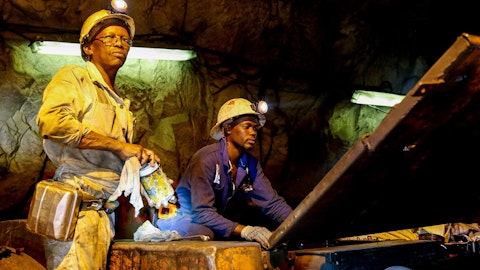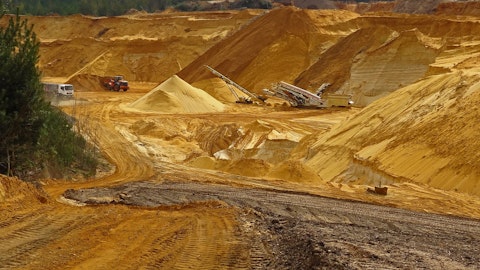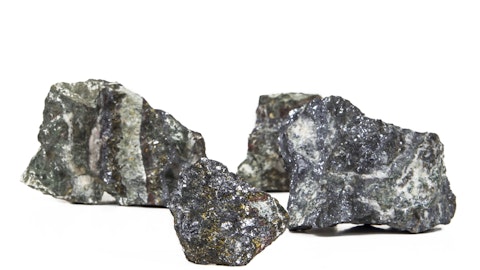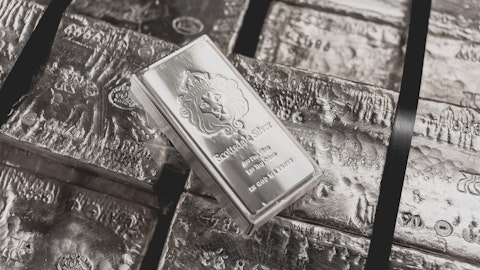Fortuna Silver Mines Inc. (NYSE:FSM) Q3 2023 Earnings Call Transcript November 9, 2023
Operator: Greetings, and welcome to the Fortuna Silver Mines Q3 2023 Financial and Operational Results Call. At this time, all participants are in a listen-only mode and the floor will be open for questions after the presentation. [Operator Instructions] Please note this conference is being recorded. I will now turn the conference over to your host Jorge Alberto Ganoza, CEO of Fortuna Silver Mines. Jorge over to you.
Jorge Alberto Ganoza: Thank you, Jenny, and good morning to all and welcome again. In addition to myself, we have on the line Luis Dario Ganoza, Chief Financial Officer; Cesar Velasco, Chief Operating Officer of Latin America; and David Whittle, our Chief Operating Officer for West Africa. For your reference during the conference call, we have provided a third quarter results presentation available on the landing page of our website under Featured Presentations. As we will be making forward-looking statements during the call, please refer to our cautionary statements included in the presentation, news release, MD&A and the risk factors in our Annual Information Form. Technical information in the presentation has been reviewed and approved by Eric Chapman, our Senior Vice President, Technical Services and qualified person.
Financial figures contained in the presentation and discussed in today’s call are presented in U.S. dollars unless otherwise stated. Yesterday before market opened, we reported record production and financial results. Our noteworthy results are the successful outcome of 2 years of hard work and focused execution on our strategic plan. We have placed ourselves in a strong position to deliver shareholder value today and into the future. Since the Roxgold acquisition in mid-2021, we have successfully expanded and consolidated our presence in two of the most exciting mining regions in the world, West Africa and Latin America. We have a balanced mine asset portfolio that offers multiple value enhancing opportunities. Now, let me tell you why the achievements of this quarter are so important.
I see this as an inaugural quarter due to the start of contribution of our feed and flagship mine Séguéla. So I will be comparing performance versus the previous second quarter, which I believe helps better see the impact and the change in the business. Production and financial results are highlighted by record figures across all relevant metrics of the business. Gold equivalent production of 128,671 ounces, an increase of 38% compared to the second quarter of this year; sales of $243 million, an increase of 53% compared to the second quarter; net earnings of $27.5 million or $0.09 per share; adjusted net earnings of $0.10 per share, beating analyst consensus; and notably, large free cash flow from operations amounting to $70 million compared to $9.5 million in the second quarter.
Our consolidated cash cost was well below $900 and AISC was $1,312 per gold equivalent ounce. We continue tracking well to meet the upper end of guidance range for the year powered by the Yaramoko, Séguéla and Caylloma mine contributions. The record financial performance was mainly driven by Séguéla, our flagship mine, contributing full quarter production for the first time. In addition, we also benefited from higher gold production at Yaramoko related to higher grades in new extensions of Zone 55, as well as an overall steady performance across the mine’s portfolio where we observed abating inflation in consumables and recorded gains from continued optimization initiatives. In terms of our Séguéla mine, we were still ramping up production during the third quarter.
By the end of September, the process plant was exceeding nameplate capacity of 154 tonnes per hour by 13%. Looking forward, in the fourth quarter, we expect to benefit from steadier production at higher throughput rate. The mine recorded gold production of 31,498 ounces at a cash cost of $395 per ounce and AISC of $788 per ounce, industry-leading cost. Over the coming months, we expect cash cost and AISC to gradually gravitate towards our guidance projections in the range of $500 for cash cost and $1,000 for AISC. This is explained by higher projected stripping in our plants and longer haulage distances as pit operations advance. David will provide further insights into our operations at Séguéla and Yaramoko later on. As we transition out of two years of intensive investment and enter a cash harvest phase, capital allocation becomes a topical issue for us.
Our priorities are to continue strengthening the balance sheet through debt reduction. Our debt leverage ratio currently stands at a low 0.5x net debt to EBITDA. However, we want to see that ratio well below 0.5x under different conservative scenarios. Another priority is ensuring exploration programs remain well funded with a focus on high value opportunities in the portfolio and reserve replacement of our mines. Currently, we have 11 drill rigs turning across our properties and we remain open to other avenues to continue enhancing shareholder value. For example, with our bank lenders, we’re in discussions to lift certain covenants to become active again on our share repurchase program. In September, we completed the acquisition of Chesser Resources and the Diamba Sud gold project in Senegal.
Diamba Sud is an exciting advanced stage exploration opportunity and a very strategic fit for us. It complements our advanced project pipeline and Senegal is a near neighbor country to our existing operations. We’re making best use of time here and are already drilling with 3 rigs exploring for additional ounces. Also during September and October, we had good news at our San Jose Mine in Mexico. We announced receipt of a positive Mexican court ruling reinstating our 12-year environmental impact authorization. The court did not give any credit to the surprising January resolution issued by the Mexican Environmental Agency SEMARNAT. Our mine has operated normally throughout this cycle with SEMARNAT and we hope this noise is behind us now. In September, we announced the discovery of a new high grade mineralized structure at San Jose named Yessi.
The discovery hole intersected 9.9 meters at 1.2 kilograms silver equivalent per tonne within a broader halo of mineralization. Yessi is located east of the main Trinidad-Victoria system where production takes place currently and some 200 meters from existing underground infrastructure. Yessi is a blind discovery, meaning it does not have any recognizable surface expression and we’re currently drilling with 2 core rigs working to gain better geologic understanding of this new zone. On health and safety across the business, we recorded 1 LTI. As of the end of the quarter, our year to date LTI frequency rate stands at 0.38 and the total recordable frequency rate at 0.86. This compares to 0.22 and 2.37 a year ago respectively. Worth noting is the achievement of our Yaramoko Mine team which in the quarter recorded 3 years free of lost time injuries.
Year-to-date, we have no reportable events on the environment. I will now let David and Cesar provide a high level overview of our business and performance in West Africa and Latin America. We can start with you, David.
David Whittle : Yes, thanks, Jorge. Operations in West Africa performed strongly during the third quarter of 2023. All sites demonstrated excellent safety performance with no significant instance and zero LTIs. At Séguéla, the mine’s first full quarter of production resulted in 31,498 ounces of gold, which followed the successful completion of the processing plant performance test in August. The operation is now exceeding nameplate capacity. At Yaramoko, guidance was increased by approximately 14% to 110,000 to 120,000 ounces, and the mine also achieved a milestone of operating 3 years without an LT time. In the third quarter, Séguéla mined 502,326 tonnes of ore at an average grade of 3.48 grams per tonne and 1,156,540 tonnes of waste with a strip ratio of 2.3. Ore processed was 310,387 tonnes at 3.83 grams per tonne.
Mining operations focused on the Antenna Pit in order to access the higher grade areas and to source sufficient fresh rock for the completion of the processing plant’s performance test. At the Ancien Pit, the first program of grade control drilling took place, topsoil stripping and storage commenced and the haul road construction continued as planned. At the Koula Pit, initial grade controlling started and should be completed in the fourth quarter of this year. Process plant operations wrapped up beyond the nameplate capacity of 154 tonnes per hour during the quarter, achieving an average rate of 3 point of 162 tonnes per hour. In September, an average 3 point of 174 tonnes per hour was reached. Process plant improvements are currently allowing for a feed blend of approximately 40% transitional and oxide ore, which enables the processing of additional quantities of some of the higher grade oxide ore mined earlier in the year.
Long-term oxide transitional feed will be in the order of 10% to 15%. Séguéla’s strong performance resulted in both cash cost per ounce and AISC being below guidance range of $395 and $788 an ounce, respectively. Following the operation’s strong performance in the quarter, we continue to see improvements in throughput and a continuation of good grades and positive reconciliation into the processing plant. As a result, we expect gold production to achieve the upper end of guidance. At Yaramoko, strong production performance delivered 34,036 ounces of gold. Mined production at Yaramoko was 127,060 tonnes at an average grade of 8.12 grams per tonne. Mining operations were chiefly from the 55 Zone underground mine. Development continued at the QV ore body at the Bagassi Mine, the first stoping operations commencing towards the end of quarter.
At the processing plant, 137,281 tonnes were treated at an average grade of 7.72 grams per tonne, recovery at 98.5% enabled by the increased feed grade. The increase in production resulted in year-to-date AISC at Yaramoko being below the lower end of annual guidance at $1,429 per ounce. In the third quarter, Roxgold, in cooperation with other mining groups and stakeholders engaged with the government of Burkina Faso with regards to the government’s proposed variation to metal royalties. This collaborative approach has seen a small increase in royalties of 1.5% at current gold prices with a maximum increase of 2% once gold prices exceed $2,000 an ounce. Mining development operations continue to encounter high grade areas with ore body widths generally greater than previously experienced.
Stoping activities are starting to progress in some of these higher grade areas. And as a result, we expect 2023 production to be within the revised guidance range of 110,000 to 120,000 ounces. The company anticipates having a similar gold production range in 2024. Diamond drilling during the third quarter was focused on the lower Eastern side of the 55 Zone ore body. Drill results have seen an extension on strike to expected mining boundaries as well as the inclusion into the mine plan of an additional eastern ore drive at the lowest part of the 55 Zone ore body. Drilling in the fourth quarter and throughout 2024 will focus again on testing further western strike extensions of 55 Zone as well as testing for potential deeper extensions. Back to you, Jorge.
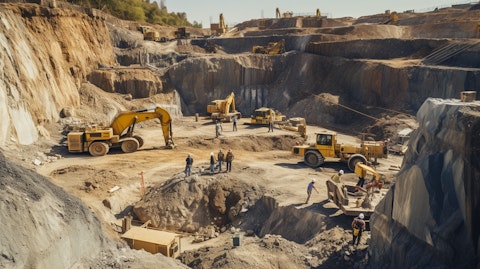
Jorge Alberto Ganoza: Thank you, David. Cesar?
Cesar Velasco: Thank you, Jorge, and good morning to everyone. On a consolidated basis, the Latin American operations delivered solid gold and silver production, with good safety performance in the quarter. We also continued to advance several key sustaining capital projects at both the Lindero and Caylloma mines. Regarding costs, we are starting to see some reduction tendencies on main supplies and consumables, like diesel, cement, sulfuric acid, cyanide and other reagents. In Mexico, we’re experiencing some pressure from the strengthening of the Mexican peso versus the U.S. dollar of roughly 20% when compared to 2022 levels. Now I will discuss our operational performance during the third quarter. In Argentina, Lindero mined 1.9 million tonnes of ore with a stripping ratio of 1.1 to 1.
And looking forward, the stripping ratio is expected to continue its positive trend through to the end of the year to approximately 0.7 to 1. A total of 1.5 million tonnes of ore were placed on the leach pad at an average gold grade of 0.62 grams per tonne containing an estimated 29,068 ounces of gold. Lindero’s gold production in the quarter was 20,933 ounces, in line with the mining sequence and the mineral reserves. In accordance with our mine plan, the higher stripping ratios seen in the first 9 months of the year positioned us for improved access to higher grade material to be mined during the upcoming fourth quarter. As a result, Lindero anticipates placing about 1.6 million tonnes of ore on the leach pad, at a higher average grade of 0.67 grams per tonne.
One of the most relevant capital projects for Lindero in 2023 and 2024 is the leach pad expansion, which will serve for the next several years of production. As of September 30th, this project is 13% complete. Mobilization of the contractors, personnel and equipment has already commenced. The first shipments of geomembrane and geosynthetic clay liner have arrived at site, and the project remains on schedule for conclusion during the second half of 2024. The estimated time of completion is aligned with the stacking plan and production requirements for next year. AISC for the quarter was $1,611 per ounce, mainly due to higher cash cost per ounce, resulting from a combination of lower production and higher indirect cost, but partially compensated by higher capitalized stripping costs.
AISC is expected to be at the high end of annual guidance as CapEx execution picks up in the fourth quarter. Lindero continues capturing significant savings, particularly on key consumables, and the focus remains on cost control and good CapEx execution. Moving up to Mexico. San Jose’s production reflects a 43% and 42% increase in silver and gold production when compared to the previous quarter. The mine produced 1.4 million ounces of silver at an average head grade of 189 grams per tonne and 8,205 ounces of gold at an average head grade of 1.14 grams per tonne. Management continues executing on an improved mining and processing plan through year-end to recover part of the lost production from the second quarter. Silver and gold production for the third quarter of 2023 when compared to the third quarter of 2022 is explained by the lower grade profile of the mineral reserves in the mine plan.
San Jose is estimated to be approximately 15% above the upper end of its cost guidance for the year as a result of catching up during the fourth quarter and postponed development meters from the previous quarters. AISC for the year incorporates an intensive infill drilling campaign at the recently discovered Yessi Vein, where additional drilling is underway from both surface and underground. Regarding Peru, Caylloma produced 308,221 ounces of silver. This is a 6% increase from the same period in 2022 at an average head grade of 83 grams per tonne silver. The mine is well positioned to achieve the upper end of annual guidance. Zinc and lead production was 14 million and 10.3 million pounds respectively which represents an 18% and 14% increase in production from the same period in 2022.
Increased production is the result of positive grade reconciliation to the reserve model in levels 16 and 18 of the Animas vein. Zinc and lead average head grades were 5.07% and 3.66%, a 16% and 10% higher for zinc and lead, respectively, when compared to the same period in 2022. Increased recoveries for zinc and lead were driven by those higher grades. I think that covers Latin America operations. Back to you, Jorge.
Jorge Alberto Ganoza : Thank you, Cesar. Luis, review for financials.
Luis Dario Ganoza: Sure. Thank you. So I’ll be focusing my commentary on the comparable quarter of 2022. Sales of $243.1 million in the third quarter of this year were $77 million above Q2 — Q3 of 2022. This is a 46% increase explained primarily by the contribution of 35,500 ounces of gold from Séguéla in the quarter as well as higher metal prices. Year-over-year realized gold and silver prices were up 12% and 23%, respectively. Our cash cost of sales per gold equivalent ounce was $814. This is 8% or $67 per ounce below the prior year. Cash cost of sales at Séguéla was $397 per ounce and slightly below $500 per ounce when including capital leases related to the mining contractor, which are reported as part of AISC, but excluded from cash cost per ounce.
At Yaramoko, we have also reported a significant reduction in cash cost per ounce of approximately $180 related to the effect of higher grades, a trend that has remained constant throughout the year as David pointed out. These positive impacts were partially offset by a higher cash cost per gold equivalent ounce at Lindero and San Jose. In the case of Lindero, this is mostly aligned with the expected reduction in head grades consistent with the mine plan. In the case of San Jose, this is mainly due to higher mining costs to make up for the shortfall of production in the second quarter of this year related to the illegal blockade and higher maintenance and indirect costs. As a result of the higher volumes sold, lower cost per ounce and higher metal prices, mine operating income increased 166% year-over-year, while our general and administration expenses remained for the most part constant.
This strong operating leverage effect has resulted in an increase in operating income of almost 700% from $5.7 million in Q2 of last year to $45.5 million in Q3 of 2023. We have disclosed we expect higher depletion at Séguéla in future quarters related to the purchase price allocation from the Roxgold acquisition. We anticipate depletion will increase over the next 2 to 3 quarters towards run rate levels on a per ounce basis. We estimate that for the level of ounces sold in the quarter, this would add an additional noncash charge of around $10 million to cost of sales or approximately $300 per ounce. Continuing with our income statement, we have recorded $8.2 million of net interest and finance costs compared to $2.4 million in Q3 2022. This $8.2 million in 2023 is comprised of $5.1 million of net interest charges and $3.1 million of accounting accretion for various concepts including mine closure, right of use assets and the outstanding convertible debt.
In the comparable quarter, $1.3 million of interest charges were capitalized whereas no interest capitalization took place in Q3 of the current year. Our effective tax rate in the quarter was 18%. As we have disclosed as well, no income tax was recorded at Séguéla in the quarter due to income tax offsets from the construction phase. Under a full income tax scenario, we would expect effective tax rates on a consolidated basis between 35% and 40%. Moving on to free cash flow and liquidity, we reported $70 million of free cash flow on the back of strong cash from operations of $106.5 million. Compared to the prior year, free cash flow and cash from operations increased by $36 million and $42 million, respectively. Our total liquidity at the end of the quarter was $162.3 million, up $64.4 million from the end of June 2023, reflecting the strong free cash flow generation in the quarter.
As Jorge mentioned, we paid down $40 million of debt and expect to continue paying down debt in the coming quarters. As a reference, the $40 million of debt reduction represents quarterly interest expense savings of approximately $0.8 million at current interest rates. Finally, at the end of Q3 2023, our total net debt was $134 million, down from $198 million in June 2023 for a total net debt to EBITDA ratio of 0.5. Back to you, Jorge.
Jorge Alberto Ganoza: Thank you. That concludes management’s discussion of results. Jenny, back to you.
Operator: Thank you very much, Jorge. At this time, we will be conducting our question-and-answer session. [Operator Instructions] Your first question is coming from Eric Winmill of Scotiabank.
See also 11 Best S&P 500 Stocks To Buy According to Ray Dalio’s Bridgewater Associates and 13 Best Affordable Dividend Stocks To Buy.
Q&A Session
Follow Fortuna Silver Mines Inc (NYSE:FSM)
Follow Fortuna Silver Mines Inc (NYSE:FSM)
Receive real-time insider trading and news alerts
Eric Winmill: Hi, Jorge and team. Nice to see the free cash flow in Q3 and the stock responding well. Just a few quick questions for me, if you don’t mind. At Lindero, on the Phase 2 leach pad expansion, can you just remind me what the critical path items are? And I guess how much additional tonnages will get you?
Jorge Alberto Ganoza: Sure. Critical path and — Cesar, do you want to expand?
Cesar Velasco : Sure, Jorge. Well, critical paths were in fact the geomembrane and geosynthetic clay liners. Those were properly purchased in time and are on their way to site. First shipments have already arrived, almost 30% to 40% of those, the remaining ones in the first quarter of 2024, and now the civil contractor mobilization, which is one of the main packages and activities who is mobilizing as we speak. So that should cover those critical paths and be in line with logic.
Jorge Alberto Ganoza: With respect to the second part of the question, this expansion of the leach pad was contemplated in the original design, and it serves basically the — supports the [loan]. It does not provide for an expansion of throughput. It was a scheduled expansion in the original design to support the 19,000, 20,000 tonnes per day of ore that we run through process.
Eric Winmill: And in terms of exploration at Lindero, any comments there? As you recall, was Arizaro one of the targets there?
Jorge Alberto Ganoza: At Lindero, we have focused our exploration funding in 2023 with priorities in Séguéla as high value opportunities. And then on life of mine replacement, the funding has been prioritized for the Yaramoko Mine and the San Jose Mine, right? So Lindero and Caylloma have not received any significant funding in 2023 and we would expect to see some funding allocated towards Arizaro in 2024, right? Remember that 2023 still has been a capital-intensive year for us on the Séguéla build. So we rationalize a bit our exploration funding.
Eric Winmill: Maybe just one more for me if you don’t mind. San Jose obviously some pretty great exploration results recently. I know it’s still early days, but any comments on what you think that could mean for the mine plan?
Jorge Alberto Ganoza: Yessi is an exciting discovery, very exciting, high grade, close to existing infrastructure. But as is the case, now we have to migrate from an exciting discovery to see how does this contribute to our production, right? And that’s the phase we are currently in and we need time, right? What I can say is that its high grade. It’s — structurally, it’s making sense to us. But how meaningful it is or it becomes to the production? It’s something that we still need to answer. And that’s why we are conducting exploration work here with a high sense of priority and we’ll look forward to reporting on this as we advance.
Operator: [Operator Instructions] There don’t appear to have any further questions. I will now hand back over to the management team for any closing comments.
Jorge Alberto Ganoza: That’s all on our part. Thank you very much. Have a good day.
Operator: Thank you very much, everybody. This does conclude today’s conference call. You may disconnect your phone lines at this time and have a wonderful rest of the day. Thank you for your participation.
Follow Fortuna Silver Mines Inc (NYSE:FSM)
Follow Fortuna Silver Mines Inc (NYSE:FSM)
Receive real-time insider trading and news alerts
